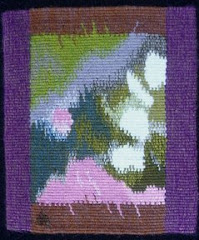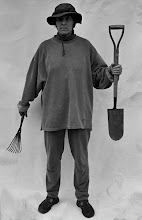In conjunction with Small Tapestry International 2: Passages, the American Tapestry Alliance organized a Northern New Mexico Studio Tour on Saturday, April 2. 

Jeane George Weigel wrote two wonderful and thoroughly researched stories about them, with photos and video, on her blog High Road Artist. After you read about Irvin, read part 1, about Lisa here.
Lisa showed us how quickly she can weave a large Saltillo rug, standing at the old loom that Irvin’s father built.
Then we watched Irvin weave on the 12 foot wide loom he designed and built himself. Very impressive and inspiring.
I’m intrigued by the standing looms. I suspect they may be better for the body than sitting all day long.
A fabric weaver friend was diagnosed with a case of Weaver’s Bottom (really!), and standing would certainly prevent that! I don’t know if it’s hard on the feet or any other body parts….

Then on to Ortegas Weaving Shop, also in Chimayo. This spacious shop has huge piles of rugs from small mug rugs and placemats, to large floor rugs, all with simple traditional designs.
I think the delicate white lines in this piece are called jaspe, but I can’t find any confirmation of that. Please let me know if I’m wrong. Ortega’s also sells clothing made from the handwoven wool fabric. 

You can buy all kinds of fiber art there, as well as materials and equipment.
I was delighted to find some of the lovely white wool warp (Clasgens) that I’d seen Lisa Trujillo using. It’s thinner than any other wool tapestry warp I’ve used before, and I think it will work at 10 epi. I can’t wait to try it out!
We used one of the rooms at EVFAC for a slide show of work by Rebecca Mezoff and Cornelia Theimer Gardella (Connie).
The slide show included images from Interwoven Traditions: New Mexico and Bauhaus, a collaboration between Rebecca, Connie, and James Koehler. The exhibit traveled from a modern Albuquerque gallery to a small church, in the medieval town of Erfurt, Germany, last summer and fall. Such beautiful work.
After the slide show, Connie showed us some actual tapestries, and dye samples (left). We were all impressed with Connie’s perfect tapestry circle, which, as any tapestry weaver can tell you, is very difficult to achieve.
My photo was taken from a strange angle as the tapestry is fairly large, and it was lying on a table, but you can still see how smoothly the curves are woven.
I



 When I entered this show, and saw that the first venue was
When I entered this show, and saw that the first venue was 
 I spent most of Friday wandering around Taos looking for a necklace or earrings to match the red border of my tapestry, and luckily I found both! I like to dress to match my tapestries when I attend opening receptions, just in case someone takes my picture in front of my tapestry; wouldn’t want to clash!
I spent most of Friday wandering around Taos looking for a necklace or earrings to match the red border of my tapestry, and luckily I found both! I like to dress to match my tapestries when I attend opening receptions, just in case someone takes my picture in front of my tapestry; wouldn’t want to clash!  I had lunch with fellow tapestry blogger,
I had lunch with fellow tapestry blogger,  The opening reception was quite well attended, and I’m sorry I didn’t take enough photos, but I was buy schmoozing. You can see all of the tapestries in the very reasonably priced
The opening reception was quite well attended, and I’m sorry I didn’t take enough photos, but I was buy schmoozing. You can see all of the tapestries in the very reasonably priced 



